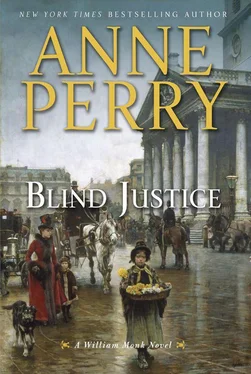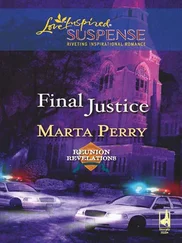Anne Perry - Blind Justice
Здесь есть возможность читать онлайн «Anne Perry - Blind Justice» весь текст электронной книги совершенно бесплатно (целиком полную версию без сокращений). В некоторых случаях можно слушать аудио, скачать через торрент в формате fb2 и присутствует краткое содержание. Жанр: Исторический детектив, на английском языке. Описание произведения, (предисловие) а так же отзывы посетителей доступны на портале библиотеки ЛибКат.
- Название:Blind Justice
- Автор:
- Жанр:
- Год:неизвестен
- ISBN:нет данных
- Рейтинг книги:4 / 5. Голосов: 1
-
Избранное:Добавить в избранное
- Отзывы:
-
Ваша оценка:
- 80
- 1
- 2
- 3
- 4
- 5
Blind Justice: краткое содержание, описание и аннотация
Предлагаем к чтению аннотацию, описание, краткое содержание или предисловие (зависит от того, что написал сам автор книги «Blind Justice»). Если вы не нашли необходимую информацию о книге — напишите в комментариях, мы постараемся отыскать её.
Blind Justice — читать онлайн бесплатно полную книгу (весь текст) целиком
Ниже представлен текст книги, разбитый по страницам. Система сохранения места последней прочитанной страницы, позволяет с удобством читать онлайн бесплатно книгу «Blind Justice», без необходимости каждый раз заново искать на чём Вы остановились. Поставьте закладку, и сможете в любой момент перейти на страницу, на которой закончили чтение.
Интервал:
Закладка:
His eyes took in the beauty of it, but it was curiously meaningless to him. His instinct to turn and say “Isn’t that lovely?” was so strong he had to remind himself there was nobody in the house to say it to. It was far too personal a thing to say to a servant. A maid would think it inappropriate and perhaps even be alarmed at the familiarity of it. A butler or footman would be embarrassed. To any of them it would betray his loneliness, and one did not do that. Servants knew perfectly well that masters or mistresses were flawed, made mistakes. No one was more aware of that than a lady’s maid or a valet. They knew of physical weaknesses and many emotional ones as well. But it was all unspoken.
He had lived alone quite happily before his marriage. In fact, long ago, when he had been in love with Hester and considering asking her to marry him, it has been the loss of his privacy, the thought of always having someone else in the house that had stopped him.
Could he have made her happy? Probably not the same way Monk did. He had not Monk’s fierce, brave, erratic passion. That was what Hester needed, to match her own.
But would Rathbone have tried, if he had had the courage to risk the hurt as well as the happiness? Now he would never know.
Should he have behaved differently with Margaret? He had been so certain of her, of them, in the beginning; it seemed incredible now how that had changed. Was he deluding himself? He remembered it all so clearly with a sharpness that was like the edge of a knife on the skin. She was not beautiful, but she had had a grace that was worth far more to him. That was an inner quality. Too often beauty masked the lack of anything deeper. How long could one remain fascinated by the glow of lovely skin or the perfect curve of a cheek or a neck if there were no courage or passion beneath it, no laughter or imagination, above all, no tenderness?
He had seen those things in Margaret, or he thought he had. Was it his fault that they had not survived her father’s disgrace and Rathbone’s failure to save him? It was unclear to him what else he could or should have done to try and fix them.
It was, after all, Margaret who had insisted Rathbone defend Arthur Ballinger. He had seemed the obvious choice then. He had been the most brilliant lawyer in London. That was not an affectation, simply the truth. And both of them had been certain that Ballinger was innocent.
The unraveling evidence had shown Rathbone his error, but Margaret had never accepted it. Even now, after Ballinger’s death, she refused. She still blamed Rathbone. He could see her face in his mind’s eye, ash pale, twisted with fury and a pain she could not bear. She had accused him of putting ambition before loyalty, love of himself before love of his family. She believed he had sacrificed her father on the altar of his own pride.
Nothing he said could persuade her that he had had no choice. Ballinger had been guilty, and whatever Rathbone had wanted, he could not prove anything else. God knew he had tried! To begin with, the evidence had been slight and could have been used to argue several different conclusions. Then, one by one, other events had driven the case to the final tragedy. Rathbone would never forget the horror of that, but nothing he could say or do mitigated his guilt in Margaret’s eyes. She knew Ballinger only as her father, the man who had loved her and protected her all her life. She could not see him as a blackmailer, a criminal.
Rathbone was only the man she had married and loved briefly. She had begged for his help, assumed his loyalty, and could not forgive his failure. In her eyes, there were but two possibilities: either her father was not as she had believed or her husband was not. It was all her life, all the memories, the fabric of who she was compared with a short marriage to a man she had cared for but perhaps never been passionately in love with. Looking back, Rathbone thought there had never been a real conflict in her mind. Of course she had chosen her father.
After his terrible death she had no longer wanted to be under the same roof as Rathbone. Her grief, her rage had been overwhelming. She had taken the few belongings that were hers and gone back to comfort her mother in her new widowhood and social disgrace.
At first Rathbone had believed that she would return within a few weeks, but time had gone on, and it was now more than a year since she had left. Several times he had attempted to bridge the gulf between them. He had thought she would realize that she was being unfair, blaming him for Ballinger’s death. She would accept that there was never anything he could have done to save him.
But every attempt at reconciliation had only driven the wedge deeper between them. Now he began to question whether they had ever loved each other at all, or if it had been more a matter of wanting to love, wanting not to be alone, and therefore seeing the good, building on it, slowly sharing more of the small pleasures of their daily lives.
When tragedy had come the fabric had proved too weak.
Should he have loved her more? Or should he have waited for a searing passion, a love that governed his whole life, before he married?
That was ridiculous. How many people even felt such a thing? Perhaps it was no more than a fever that passed anyway. Infatuation is not love. Love needs trust and balance. It needs both sharing and also the ability to be at peace in silence. Perhaps it needs a common faith in certain values, in honor and compassion, and the courage to go forward in the face of pain. It has to contain mercy, and gratitude for the joys of life, on both sides.
It must not demand perfection. What would perfection know or understand of the frailties of a vulnerable person, the failures of someone brave enough to try what is difficult?
Margaret had been immature.
Rathbone had been immature also. He should have been gentler with her. Certainly he should have been wise enough not to undertake Ballinger’s defense alone. But if he had taken assistance she would have blamed him for not having thrown his whole weight behind it. She would have said his backing away from the case in any regard would make the court assume he thought Ballinger guilty from the start.
He had still not told her the whole story about the dreadful legacy her father had deliberately left to him, his final vengeance. She would still blame Rathbone, and hate him the more for it. It would mend nothing.
Was it a gentleness in him that stilled his tongue? Disillusion is one of the bitterest pains anyone can face. Some people cannot bear it; they break under the weight. Margaret was one of those. Maybe he still had some lingering tenderness toward her, a need to protect her from the truth if she did not have to know it.
Or was he simply too bruised and too weary inside to face another series of quarrels and rejections? Not that it mattered. There was no need to tell her.
He had never had to face the worst of disillusion himself, not one that came anywhere near hers. His own father was the best man he had ever known. Even standing here on the edge of the empty summer garden, watching the birds and the few butterflies sitting on the silent, brilliant flowers, he smiled thinking of Henry Rathbone. Of course, his father was fallible, and he himself would be the first to admit it. He was a mathematician and inventor, a man whose mind was brilliant, yet when others spoke of him it was his kindness they spoke of first.
He could remember his mother only as a slim figure from his childhood, someone warm and safe who made him laugh, comforted his early pains and fears, and who told him he could accomplish anything, if he tried hard enough. She believed in him totally.
She had died when he was twelve and away at boarding school. She had said he could do anything; he had thought then if he had been at home surely he could have saved her. He remembered the sharp, twisting pain of loss and the disbelief in his boyish mind, and then the guilt. He should have been there. Why had she not told him, not trusted him? What was wrong with him not to have seen it himself? She must have been ill for a long time before. It wasn’t sudden.
Читать дальшеИнтервал:
Закладка:
Похожие книги на «Blind Justice»
Представляем Вашему вниманию похожие книги на «Blind Justice» списком для выбора. Мы отобрали схожую по названию и смыслу литературу в надежде предоставить читателям больше вариантов отыскать новые, интересные, ещё непрочитанные произведения.
Обсуждение, отзывы о книге «Blind Justice» и просто собственные мнения читателей. Оставьте ваши комментарии, напишите, что Вы думаете о произведении, его смысле или главных героях. Укажите что конкретно понравилось, а что нет, и почему Вы так считаете.












